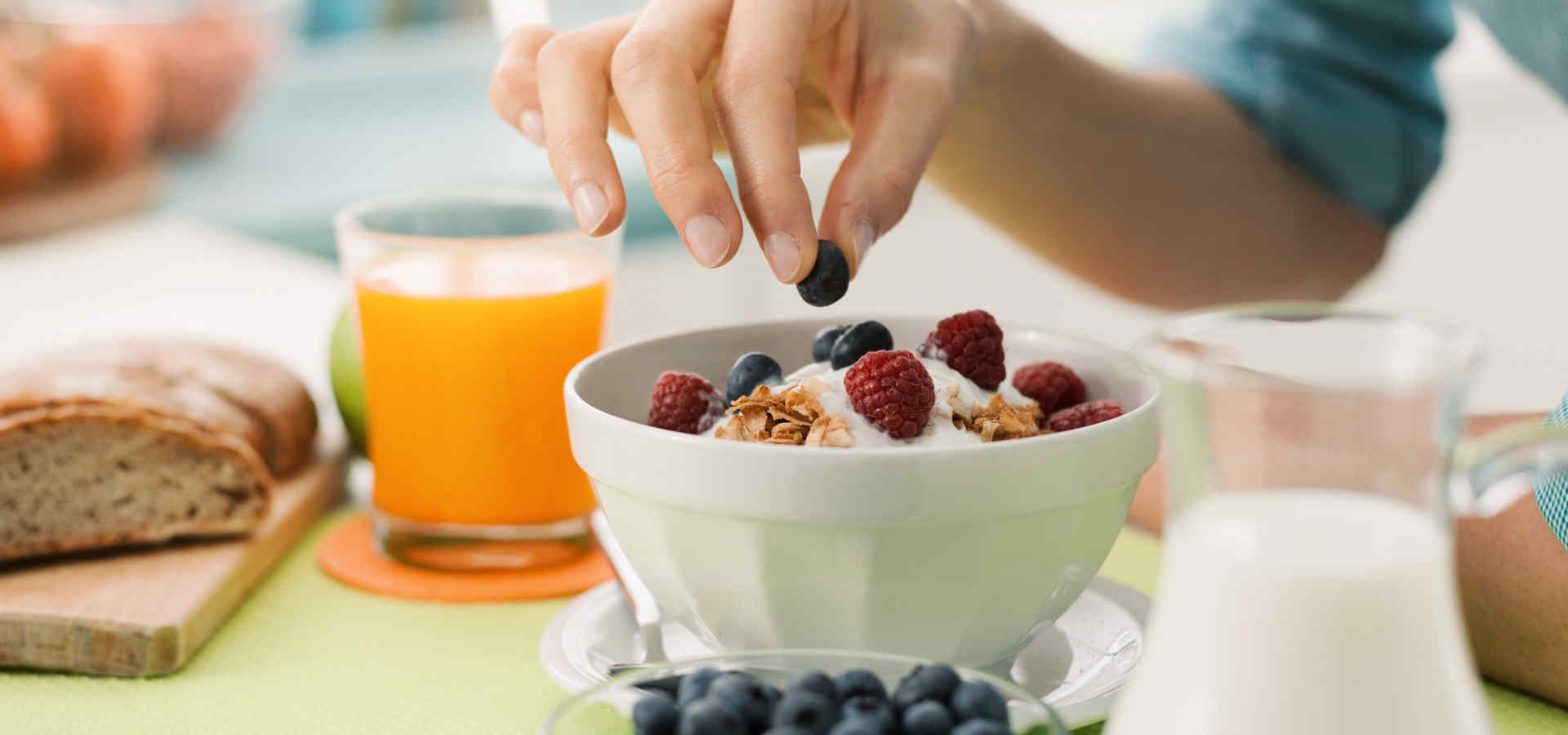
How To Improve Memory Naturally
READ THE
FULL ARTICLE →
How to Improve Memory Naturally
The beneficial health effects of blueberry, curcumin, omega 3s and green tea
You might struggle with brain fog, tiredness, and wonder how to improve concentration. Imagine being able to start each day full of energy, feeling rested and positive, having a better memory, and ready to overcome any obstacle that may arise.
Thanks to recent advances in neurosciences this ideal life is now within reach!
Adult Neurogenesis – The Key Factor for Brain Health?
Neurogenesis is the formation of new neural system cells from stem cells, and it occurs rapidly in the prenatal phase. It was previously thought to cease soon after birth, but the formation of certain brain cells continues at low rate throughout the entire lifetime.
The renewal of brain cells doesn’t happen in every part of the brain, but does occur in the hippocampus, which is responsible for consolidation of information and plays a role in long-term mood regulation. Finding and understanding the role of adult neurogenesis is one of the most revolutionary discoveries of brain sciences in the past decades.
Adult neurogenesis - How to Improve Memory Naturally
Based on scientific studies, a higher rate of adult neurogenesis is associated with many favorable outcomes including:
- Overall cognitive flexibility [1]
- Better learning and memory consolidation [2]
- Lower risk for major depressive disorder and anxiety [3]
- Lower risk for neurodegenerative disorders (e.g. Alzheimer’s disease) [4]

On the other hand, there are several factors known to decrease the rate of the neurogenesis:
- Chronic stress [5]
- Chronic inflammation [6]
- Sleep disruptions [7]
- Alcohol consumption [8]
- Tobacco [9]
There is a huge variation in the natural rate of the neurogenesis between individuals and the rate has been shown to be inheritable [10]. With a low rate of neurogenesis, a person is prone to cognitive disorders, memory loss, depression, and anxiety.
With a high rate of neurogenesis, a person can better preserve cognitive abilities, is more immune to adversities of life, and can more easily combat neurodegenerative disorders and the naturally occurring age-related decline of the IQ.
Luckily, adopting a healthy lifestyle with a few carefully chosen natural diet supplements can easily increase neurogenesis. This article concentrates on the lifestyle factors, foods, and supplements that promote neurogenesis.
Blueberry health benefits
Blueberries Vaccinium corymbosum and their European “cousins” bilberries (Vaccinum Myrtillus L.) have been classified as superfruits for years due to their general health-boosting properties. Numerous studies support this claim and the body of evidence is constantly growing as new studies are conducted.
Blueberry health benefits - How to Improve Memory Naturally and How to Improve Concentration
The beneficial health effects of the blueberry are due to its high anthocyanin content. Anthocyanins, one of the major flavonoid classes, are phenolic structures that are responsible for the blue, purple, violet or red pigment of fruits and berries [11]. Anthocyanins act as strong antioxidants and they have also anti-inflammatory and anti-cancer properties [12].
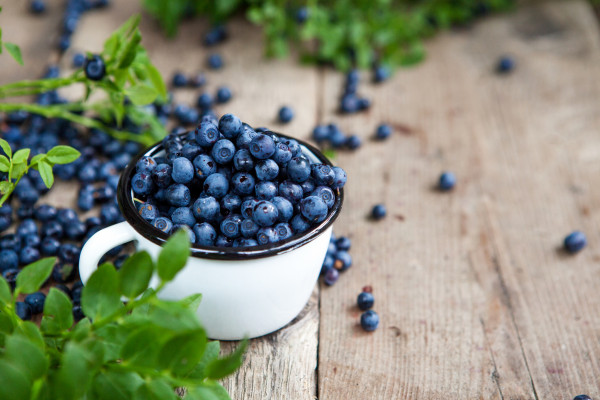
Recent studies have revealed that blueberries also promote neurogenesis and reverse the age-related cognitive decline in both human and animals. Blueberries has been shown to increase neurogenesis in aged rats [13].
Another rat study found blueberry supplementation to improve spatial memory in young rats. The researchers found elevated levels of brain-derived neurotrophic factor (BDNF) in blueberry-supplement group, which may give the neurobiological explanation to the abovementioned positive cognitive outcomes [14].
Results from human trials are even more convincing. In a 12-week trial with participants with mild cognitive impairment (a pre-dementia phase) blueberry supplementation was linked with a significant memory improvement. In addition, there was a trend suggesting reduced depressive symptoms and lower blood glucose levels [15].
Another study conducted with older people with mild cognitive impairment showed blueberry supplementation equivalent to a cup a day led to enhanced neuronal activity in working memory tasks over the course of 16 weeks.
In addition to positive cognitive effects in peoples with mild cognitive changes, supplementation with anthocyanin-rich blueberry concentrate also improves brain blood perfusion in areas associated with cognitive function in healthy older individuals [16].
All these advantageous effects combined make blueberries a miraculous supplement and almost too good to be true!
Omega-3 health benefits
Omega-3 is the name given to a group of polyunsaturated fatty acids that are probably the most thoroughly investigated diet supplement. There are three types of omega-3 fatty acids involved in human physiology: α-linolenic acid (ALA, 18 carbons and 3 double bonds), found naturally in plant oils, and eicosapentaenoic acid (EPA, 20 carbons and 5 double bonds) and docosahexaenoic acid (DHA, 22 carbons and 6 double bonds), both commonly found in abundance in cold water marine oils.
Marine algae and phytoplankton are primary sources of DHA and EPA and these omega-3s end up and accumulate in large cold-water fishes like salmon and tuna due to the marine food chain. Vegetables, fruits and nuts rich in ALA includes walnuts, edible oils, flaxseed oil and hemp oil and avocado. [17]
Omega-3 health benefits - How to Improve Memory Naturally
Omega 3 fatty acids are of crucial importance in normal cell metabolism in many cells but especially in the brain where DHA comprises of 40% of polyunsaturated fatty acids. Mammals can’t synthesize omega 3s from short chain triglycerides, but can synthesize longer-chain omega 3s (DHA and EPA) from shorter-chain omega-3 fatty acid ALA. This conversion from ALA to the important DHA and EPA may decline in aging. [18]
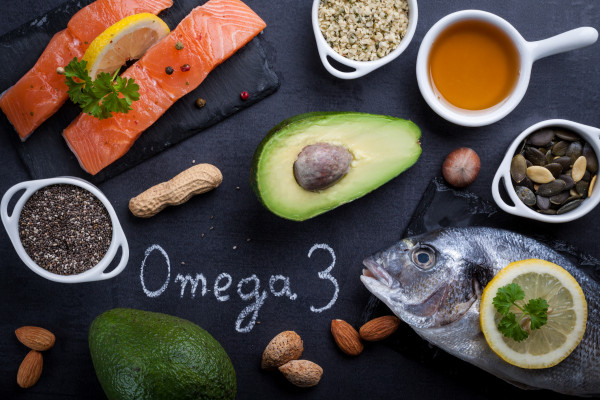
Previously it was thought that dietary supplementation of omega-3 fatty acids can prevent cardiovascular diseases and cancer, but recent large meta-analyses failed to support these claims [19] [20] [21]. However, the evidence of omega-3’s brain and mental health supporting effects is strong: omega-3s enhance neurogenesis in-vitro and in-vivo in rat embryos [22]. Omega-3s have been shown to increase BDNF levels in obese rats [23] and in people with coronary artery disease [24].
Low levels of omega-3 are reported in people with psychiatric disorders, especially with major depressive disorder (MDD). Implementing omega-3 into diet reduces depressive symptoms significantly [25]. The evidence for omega-3’s positive effects in MDD treatment is so firm that omega-3s are recommended in the major treatment guidelines.
Dietary supplementation of omega-3s, especially DHA, has been linked with better cognitive functions in older people with mild cognitive impairment [26] |27]. Red blood cell concentrations of DHA and EPA (indicating 3 months average supply rate) were shown to correlate with total brain and hippocampal volumes in postmenopausal women in an 8-year follow-up study [28]. This finding indicates omega-3s can slow down the age-related atrophy of brain cortex and hippocampus, a known risk factor for dementia.
As you can see, omega-3s help to preserve normal cognitive functions in an aging population, but what is the case with children? A meta-analysis studying effective ways to boost the IQ of children IQ found supplementing either a pregnant mother or infant formula with polyunsaturated fatty acid raising a young child’s IQ by more than 3.5 points. For the record, the other effective measures were early educational interventions, reading to children in an interactive manner and sending children to preschool. [29]
Green Tea health benefits
Green tea, just like black and yellow tea, is made from the leaves of Camellia Sinensis. Green tea originates in China where it has been manufactured for thousands of years. During this time, it has been part of central Asian traditions and its mind calming effects have been well known.
Green Tea health benefits, How to Improve Memory Naturally
Green tea has many bioactive ingredients. It contains polyphenols that are strong antioxidants, the most widely studied of which is epigallocatechin gallate (EGCG), a type of catechin. Green tea also contains stimulating caffeine, although the amount is less than in black tea or coffee. It also contains a unique amino acid called L-theanine, which has a relaxing effect and it is thought to balance the stimulating effect of caffeine in green tea. [30] [31] [32]
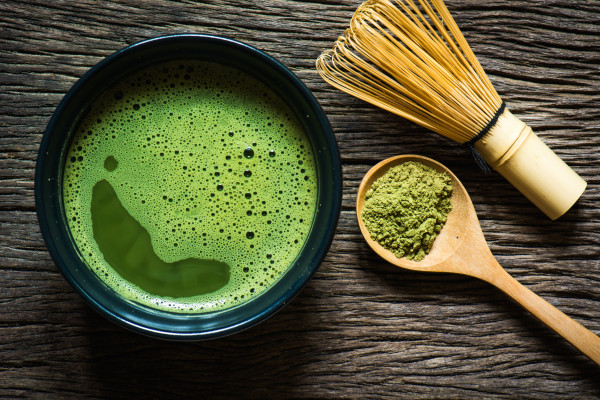
Green tea has an extensive range of cardiovascular and cognitive benefits: Consistent green tea consumption will slightly lower (2-3 mmHg) systolic blood pressure [33], lowers fasting glucose [34], lowers total and LDL cholesterol in the blood [24] and reduces the risk of cardiovascular death by 5%. [36]
How to Improve Concentration with green tea
Epidemiological studies have shown that green tea consumption is associated with a lower incidence of neurocognitive disorders such as Alzheimer’s disease [37] [38]. A high-quality double-blind controlled placebo study founded the combination of green tea extract and L-theanine to improve memory and attention in elder people with mild cognitive impairment [39].

Green tea compound epigallocatechin gallate (EGCG) was founded to increase neuronal survival and adult hippocampus neurogenesis in a recent study [40] giving a reasonable explanation to the noted positive cognitive outcomes.
Curcumin health benefits
Curcumin is the chemical compound responsible for bright yellow color in the curry spice turmeric. Turmeric, Curcuma longa, is an ancient Indian herb that has been used in traditional Indian medicine to treat various medical conditions for ages [41]. In testing, curcumin has shown to have antioxidant, anti-inflammatory [42] and anti-cancer properties [43].
Curcumin health benefits, How to Improve Memory Naturally
Epidemiological studies have shown India to have one of the lowest prevalence rates of Alzheimer’s disease [44] [45]. This fact has raised a particular interest to investigate the role of curcumin in the prevention and treatment of AD. Numerous in-vitro and in-vivo studies over the past decades have shown that curcumin has many anti-Alzheimer properties acting on many specific neuropathological pathways such as prevention of amyloid plaque formation [46], but it also increase BDNF-levels [47] and increases adult neurogenesis [48].
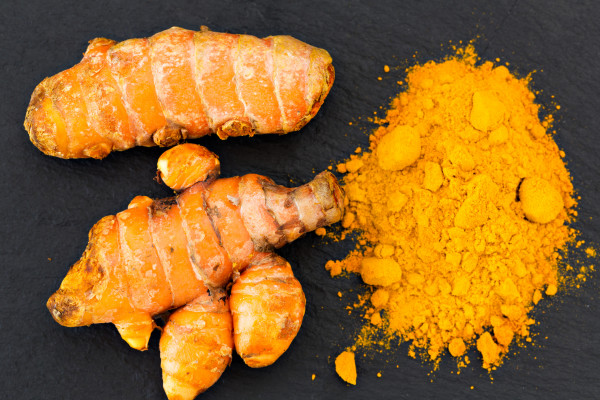
Despite of these findings, certain limitations have prevented its breakthrough and approval as preventive therapeutic agent for AD. These limitations are mainly due to the relatively low solubility and bioavailability of curcumin. The current approach is to find a new formulation for curcumin to overcome these obstacles [46]. One possible solution is to ingest curcumin with piperine, the alkaloid responsible for the pungency of black pepper and long pepper. Piperine can increase the bioavailability of curcumin dramatically [49].
How to improve memory
Based on scientific research it has been shown that memory can be improved naturally. The role of adult neurogenesis plays a big part in improving memory and your brain health. To improve memory, remember these nutrients and put them into your everyday eating:
- blueberry
- curcumin
- omega 3s
- green tea
If you want to check out our fun IQ tests to test your memory and visualization skills, click on the link below:
Have you eaten your superfoods?
Test your IQ
and boost your brain →
References:
[1] Anacker, Christoph, and René Hen. “Adult Hippocampal Neurogenesis and Cognitive Flexibility — Linking Memory and Mood.” Nature Reviews Neuroscience, vol. 18, no. 6, 2017, pp. 335–346., doi:10.1038/nrn.2017.45. https://www.ncbi.nlm.nih.gov/pubmed/28469276
[2] Kitamura, Takashi, and Kaoru Inokuchi. “Role of Adult Neurogenesis in Hippocampal-Cortical Memory Consolidation.” Molecular Brain, vol. 7, no. 1, 2014, p. 13., doi:10.1186/1756-6606-7-13. https://www.ncbi.nlm.nih.gov/pmc/articles/PMC3942778/
[3] Eisch, A. J., and D. Petrik. “Depression and Hippocampal Neurogenesis: A Road to Remission?” Science, vol. 338, no. 6103, 2012, pp. 72–75., doi:10.1126/science.1222941. https://www.ncbi.nlm.nih.gov/pmc/articles/PMC3756889/
[4] Hollands, Carolyn, et al. “Alzheimer's Disease and Hippocampal Adult Neurogenesis; Exploring Shared Mechanisms.” Frontiers in Neuroscience, vol. 10, 2016, doi:10.3389/fnins.2016.00178. https://www.ncbi.nlm.nih.gov/pmc/articles/PMC4853383/
[5] Yun, Jaesuk, et al. “Chronic Restraint Stress Impairs Neurogenesis and Hippocampus-Dependent Fear Memory in Mice: Possible Involvement of a Brain-Specific Transcription Factor Npas4.” Journal of Neurochemistry, vol. 114, no. 6, 2010, pp. 1840–1851., doi:10.1111/j.1471-4159.2010.06893.x. https://onlinelibrary.wiley.com/doi/full/10.1111/j.1471-4159.2010.06893.x
[6] Chesnokova, Vera, et al. “Chronic Peripheral Inflammation, Hippocampal Neurogenesis, and Behavior.” Brain, Behavior, and Immunity, vol. 58, 2016, pp. 1–8., doi:10.1016/j.bbi.2016.01.017. https://www.sciencedirect.com/science/article/pii/S0889159116300174
[7] Guzman-Marin, R., et al. “Hippocampal Neurogenesis Is Reduced by Sleep Fragmentation in the Adult Rat.” Neuroscience, vol. 148, no. 1, 2007, pp. 325–333., doi:10.1016/j.neuroscience.2007.05.030. https://www.ncbi.nlm.nih.gov/pmc/articles/PMC2052925/
[8] Geil, Chelsea R., et al. “Alcohol and Adult Hippocampal Neurogenesis: Promiscuous Drug, Wanton Effects.” Progress in Neuro-Psychopharmacology and Biological Psychiatry, vol. 54, 2014, pp. 103–113., doi:10.1016/j.pnpbp.2014.05.003. https://www.ncbi.nlm.nih.gov/pmc/articles/PMC4134968/
[9] Bruijnzeel, Adrie W., et al. “Tobacco Smoke Diminishes Neurogenesis and Promotes Gliogenesis in the Dentate Gyrus of Adolescent Rats.” Brain Research, vol. 1413, 2011, pp. 32–42., doi:10.1016/j.brainres.2011.07.041. https://www.researchgate.net/publication/51570401_Tobacco_smoke_diminishes_neurogenesis_and_promotes_gliogenesis_in_the_dentate_gyrus_of_adolescent_rats
[10] Kempermann, G., et al. “Natural Variation and Genetic Covariance in Adult Hippocampal Neurogenesis.” Proceedings of the National Academy of Sciences, vol. 103, no. 3, 2006, pp. 780–785., doi:10.1073/pnas.0510291103. https://www.pnas.org/content/103/3/780
[11] Lohachoompol, Virachnee, et al. “The Change of Total Anthocyanins in Blueberries and Their Antioxidant Effect After Drying and Freezing.” Journal of Biomedicine and Biotechnology, vol. 2004, no. 5, 2004, pp. 248–252., doi:10.1155/s1110724304406123. https://www.ncbi.nlm.nih.gov/pmc/articles/PMC1082901/
[12] Bowen-Forbes, Camille S., et al. “Anthocyanin Content, Antioxidant, Anti-Inflammatory and Anticancer Properties of Blackberry and Raspberry Fruits.” Journal of Food Composition and Analysis, vol. 23, no. 6, 2010, pp. 554–560., doi:10.1016/j.jfca.2009.08.012. https://www.sciencedirect.com/science/article/pii/S0889157509002622
[13) Casadesus, Gemma, et al. “Modulation of Hippocampal Plasticity and Cognitive Behavior by Short-Term Blueberry Supplementation in Aged Rats.” Nutritional Neuroscience, vol. 7, no. 5-6, 2004, pp. 309–316., doi:10.1080/10284150400020482.
[14] Rendeiro, Catarina, et al. “Blueberry Supplementation Induces Spatial Memory Improvements and Region-Specific Regulation of Hippocampal BDNF MRNA Expression in Young Rats.” Psychopharmacology, vol. 223, no. 3, 2012, pp. 319–330., doi:10.1007/s00213-012-2719-8.
[15] Krikorian, Robert, et al. “Blueberry Supplementation Improves Memory in Older Adults†.” Journal of Agricultural and Food Chemistry, vol. 58, no. 7, 2010, pp. 3996–4000., doi:10.1021/jf9029332.
(16) Bowtell, Joanna L., et al. “Enhanced Task-Related Brain Activation and Resting Perfusion in Healthy Older Adults after Chronic Blueberry Supplementation.” Applied Physiology, Nutrition, and Metabolism, vol. 42, no. 7, 2017, pp. 773–779., doi:10.1139/apnm-2016-0550.
[17] "Essential Fatty Acids". Micronutrient Information Center, Oregon State University, Corvallis, OR. May 2014. https://lpi.oregonstate.edu/mic/other-nutrients/essential-fatty-acids Retrieved 30 December 2018.
[18] Freemantle E, Vandal M, Tremblay-Mercier J, Tremblay S, Blachère JC, Bégin ME, Brenna JT, Windust A, Cunnane SC (2006). "Omega−3 fatty acids, energy substrates, and brain function during aging". Prostaglandins, Leukotrienes and Essential Fatty Acids. 75 (3): 213–20. doi:10.1016/j.plefa.2006.05.011. PMID 16829066
[19] Hooper L, Thompson RL, Harrison RA, Summerbell CD, Ness AR, Moore HJ, Worthington HV, Durrington PN, Higgins JP, Capps NE, Riemersma RA, Ebrahim SB, Davey Smith G (2006). "Risks and benefits of omega−3 fats for mortality, cardiovascular disease, and cancer: systematic review". BMJ. 332 (7544): 752–60. doi:10.1136/bmj.38755.366331.2F. PMC 1420708. PMID 16565093.
[20] MacLean CH, Newberry SJ, Mojica WA, Khanna P, Issa AM, Suttorp MJ, Lim YW, Traina SB, Hilton L, Garland R, Morton SC (2006-01-25). "Effects of omega−3 fatty acids on cancer risk: a systematic review". JAMA: The Journal of the American Medical Association. 295 (4): 403–15. doi:10.1001/jama.295.4.403. hdl:10919/79706. PMID 16434631. Retrieved 2006-07-07.
[21] Aung T, Halsey J, Kromhout D, Gerstein HC, Marchioli R, Tavazzi L, Geleijnse JM, Rauch B, Ness A, Galan P, Chew EY, Bosch J, Collins R, Lewington S, Armitage J, Clarke R (March 2018). "Associations of Omega-3 Fatty Acid Supplement Use With Cardiovascular Disease Risks: Meta-analysis of 10 Trials Involving 77 917 Individuals". JAMA Cardiology. 3(3): 225–34. doi:10.1001/jamacardio.2017.5205. PMC 5885893. PMID 29387889.
[22] Kawakita, E., et al. “Docosahexaenoic Acid Promotes Neurogenesis in Vitro and in Vivo.” Neuroscience, vol. 139, no. 3, 2006, pp. 991–997., doi:10.1016/j.neuroscience.2006.01.021.
[23] Abdel-Maksoud, Sahar M., et al. “Investigation of Brain-Derived Neurotrophic Factor (BDNF) Gene Expression in Hypothalamus of Obese Rats: Modulation by Omega-3 Fatty Acids.” Nutritional Neuroscience, vol. 20, no. 8, 2016, pp. 443–448., doi:10.1080/1028415x.2016.1180859.
[24] Agh, F., Mohammadzadeh Honarvar, N., Djalali, M., Nematipour, E., Zarei, M., Jafari Salim, S., Samavat, S. and Javanbakht, M. H. (2016) “Brain-derived neurotrophic factor (BDNF) is increased by omega-3 fatty acids in coronary artery disease: a randomized, double-blind, placebo-controlled”, Journal of Nutritional Sciences and Dietetics, 2(1), pp. 2-8. Available at: http://jnsd.tums.ac.ir/index.php/jnsd/article/view/38 (Accessed: 30December2018).
[25] Grosso, Giuseppe, et al. “Omega-3 Fatty Acids and Depression: Scientific Evidence and Biological Mechanisms.” Oxidative Medicine and Cellular Longevity, vol. 2014, 2014, pp. 1–16., doi:10.1155/2014/313570.
[26] Bo, Yacong, et al. “The n-3 Polyunsaturated Fatty Acids Supplementation Improved the Cognitive Function in the Chinese Elderly with Mild Cognitive Impairment: A Double-Blind Randomized Controlled Trial.” Nutrients, vol. 9, no. 1, 2017, p. 54., doi:10.3390/nu9010054.
[27] Zhang, Yan-Ping, et al. “DHA Supplementation Improves Cognitive Function via Enhancing Aβ-Mediated Autophagy in Chinese Elderly with Mild Cognitive Impairment: a Randomised Placebo-Controlled Trial.” Journal of Neurology, Neurosurgery & Psychiatry, vol. 89, no. 4, 2017, pp. 382–388., doi:10.1136/jnnp-2017-316176.
[28] Pottala, J. V., et al. “Higher RBC EPA + DHA Corresponds with Larger Total Brain and Hippocampal Volumes: WHIMS-MRI Study.” Neurology, vol. 82, no. 5, 2014, pp. 424–442., doi:10.1212/wnl.0000000000000080.
[29] Protzko, John, et al. “How to Make a Young Child Smarter.” Perspectives on Psychological Science, vol. 8, no. 1, 2013, pp. 25–40., doi:10.1177/1745691612462585.
[30] Dietz, Christina, and Matthijs Dekker. “Effect of Green Tea Phytochemicals on Mood and Cognition.” Current Pharmaceutical Design, vol. 23, no. 19, 2017, doi:10.2174/1381612823666170105151800.
[31] Keenan, Emma K., et al. “How Much Theanine in a Cup of Tea? Effects of Tea Type and Method of Preparation.” Food Chemistry, vol. 125, no. 2, 2011, pp. 588–594., doi:10.1016/j.foodchem.2010.08.071.
[32] Juneja, Lekh Raj, et al. “Corrigendum to ‘L-Theanine—a Unique Amino Acid of Green Tea and Its Relaxation Effect in Humans.’” Trends in Food Science & Technology, vol. 10, no. 12, 1999, p. 425., doi:10.1016/s0924-2244(00)00031-5.
[33] Khalesi S, Sun J, Buys N, Jamshidi A, Nikbakht-Nasrabadi E, Khosravi-Boroujeni H (September 2014). "Green tea catechins and blood pressure: a systematic review and meta-analysis of randomised controlled trials". Eur J Nutr (Systematic Review and Meta-Analysis). 5 (6): 1299–1311. doi:10.1007/s00394-014-0720-1. PMID 24861099.
[34] Liu K, Zhou R, Wang B, Chen K, Shi LY, Zhu JD, Mi MT (August 2013). "Effect of green tea on glucose control and insulin sensitivity: a meta-analysis of 17 randomized controlled trials". Am J Clin Nutr(Meta-Analysis). 98 (2): 340–8. doi:10.3945/ajcn.112.052746. PMID 23803878.
[24] Zheng XX, Xu YL, Li SH, Liu XX, Hui R, Huang XH (August 2011). "Green tea intake lowers fasting serum total and LDL cholesterol in adults: a meta-analysis of 14 randomized controlled trials". Am J Clin Nutr (Meta-Analysis). 94 (2): 601–10. doi:10.3945/ajcn.110.010926. PMID 21715508.
![English [EN] English [EN]](/images/worldwideiqtest/flags/united-states-of-america-flag-xs.png)
![Español [ES] Español [ES]](/images/worldwideiqtest/flags/spain-flag-xs.png)
![French [FR] French [FR]](/images/worldwideiqtest/flags/france-flag-xs.png)
![Indonesian [ID] Indonesian [ID]](/images/worldwideiqtest/flags/indonesia-flag-xs.png)
![日本人 [JA] 日本人 [JA]](/images/worldwideiqtest/flags/japan-flag-xs.png)
![한국어 [KO] 한국어 [KO]](/images/worldwideiqtest/flags/south-korea-flag-xs.png)
![Portuguese [PT] Portuguese [PT]](/images/worldwideiqtest/flags/portugal-flag-xs.png)
![Русский [RU] Русский [RU]](/images/worldwideiqtest/flags/russia-flag-xs.png)
![Thai [TH] Thai [TH]](/images/worldwideiqtest/flags/thailand-flag-xs.png)